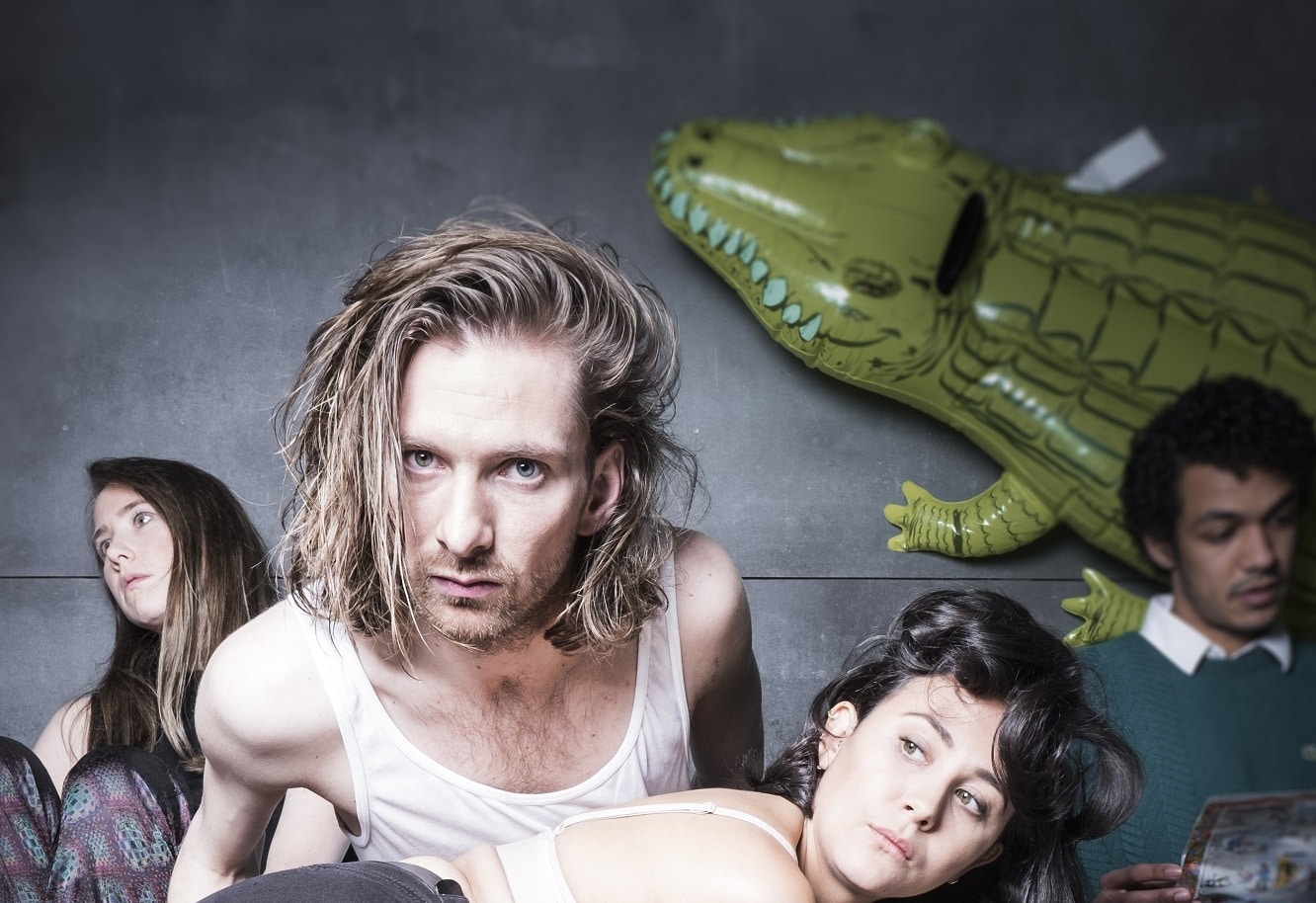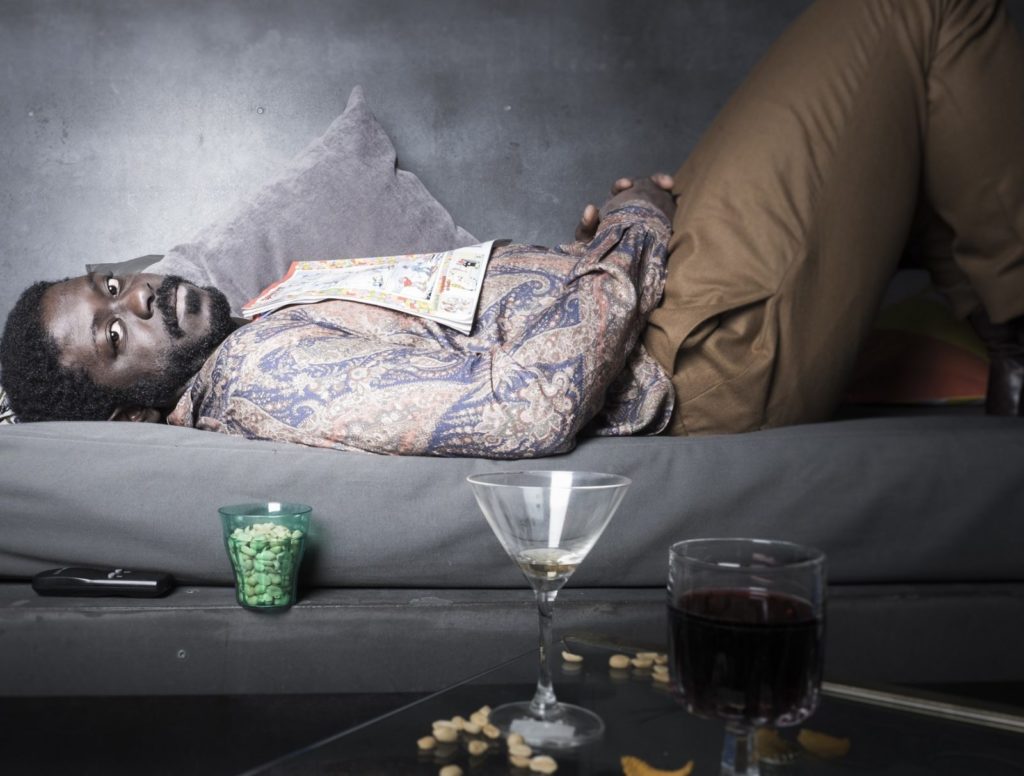Platonov, de nieuwste voorstelling van Theater Utrecht, ging op 2 maart in première en is meteen een hit: juichende recensies in alle grote kranten. Artistiek leider en regisseur Thibaud Delpeut baseert zich voor zijn versie van dit oerstuk van Tsjechov op de vertaling die acteur Jacob Derwig in 2000 maakte voor ’t Barre Land. Deze al even legendarische voorstelling paste perfect in de tijdgeest van het verse millennium. De bewerking van Delpeut plaatst het stuk nu in een groep mensen die juist uit die tijdgeest voortkomt: de millennials. Hij maakt forse ingrepen in de tekst van Derwig.
Pieter Bots, recensent en secretaris theater van de Raad voor Cultuur, verwoordde ooit in zijn artikel ‘Op Jacht naar Schrijvers’: Veel regisseurs zitten niet te wachten op een puntgaaf drama. Ze zoeken weerbarstige teksten, dramatisch gezien zijn die veel interessanter. Of ze maken een montagevoorstelling, waarin uiteenlopend gekozen tekstmateriaal precies is toegesneden op hun eigen visie.
Jij zei “met bestaande teksten kan ik alles uitdrukken wat ik wil”. Wat is er over van de tekst van Derwig?
‘Jacob heeft eigenlijk vooral een hertaling (uit het Duits) gemaakt, zijn bewerking is vooral een technische. Wat er over is vind ik eigenlijk heel lastig te zeggen omdat ik al heel lang niet met het originele script rondloop. Waarschijnlijk niet veel. In de tweede helft na de pauze zijn een aantal cruciale scenes en wat monologen over.
‘Eigenlijk heb ik alle scènes opnieuw geconcipieerd. Nee, eigenlijk is er niet veel van over…lacht… maar het is nog steeds heel erg Tsjechov!’
Tsjechov’s ♥ hartenklop
‘Ik ben wel uitgegaan van Tsjechovs hartenklop. Ben op zoek gegaan naar mijn antwoord op Tsjechov überhaupt. Dit vanuit een irritatie die ik had met de bestaande opvoerings-traditie van Tsjechov. Ik heb geprobeerd te ontdekken wat mij daar zo aan stoorde. Het is niet zozeer een commentaar op de ensceneringen, maar meer een gevoel van onbehagen: “dit kan het toch niet zijn”. Anderzijds is er die Russische lethargie, die verveling waar normaliter een soort Hollands equivalent in wordt gezocht. Dat klopt niet! Wij hebben in elk geval het uitzichtloze omgezet in een wereld van overprikkelde millennials. En gek genoeg komen we in die radicale omkering heel dicht op op Tsjechov.’
Geen laveloze personages
‘Waar je bij Tsjechov laveloze personages ziet, zonder interesse om een stap uit hun situatie te zetten, laten wij in onze voorstelling personages zien die verloren raken in een wereld die in hoge mate geflexibiliseerd is. Een wereld waarin contact vooral langs digitale wegen verloopt. In deze wereld heerst het idee dat je je voortdurend aanpast. Dat bepaalt je identiteit. De karakters in Platonov overwegen die aanpassing in een omgeving waar je marktwaarde voortdurend belangrijk is. Het heeft in hoge mate te maken met leven naar de wensen van een opdrachtgever. Want intussen is iemand al meer opdrachtnemer dan mens.’
‘Het gevolg is dat mensen hyperactief zijn en anders met elkaar praten. Ze praten op een manier die alleen ogenschijnlijk inhoudelijk is. Ze strooien meer met feitelijkheden dan dat ze vragen stellen. Dat beangstigt me, maar die communicatie is theatraal gezien tegelijk een plezier om mee te werken.’
Het origineel lijkt meer gericht op één hoofdfiguur, is er bij jullie sprake van een multi-perspectief, ofwel: zijn er meerdere hoofdrollen?
‘Tachtig procent van de voorstelling is groepsscène maar nog steeds speelt Vincent van der Valk wel de titelrol. De rode draad is zijn psychologische werdegang, maar we zijn veel meer getuige van groepsprocessen in een urban tribe. Een antwoord in een flex-wereld op verlaten instituties als verenigingen, parochies, genootschappen, familie, gezin en relatie. Zo’n urban tribe is een heel veilig antwoord. Je kunt er van alles zijn – niks moet echt – en dat moet je ook maar allemaal blijven volhouden, om de groep te laten voortbestaan. Het aangaan van relaties is ingewikkeld omdat die haaks staan op de loyaliteit naar de groep.’
Platonov uit India?
In de loft gaat de welcome back party zijn tweede dag in als daar Misja Platonov arriveert: met vrouw en kind. Weliswaar via een transfer in Siberië, maar toch echt uit India waar hij in de wereld van ambassades en NGOs serieuze taken vervulde. Had hij daar een carrière op niveau -om het land een democratische impuls te geven- het jaar is op niks uitgekomen. Terug in Nederland denkt hij zijn leven weer te kunnen hervatten maar de integratie van zijn gezin in de bestaande groep gaat niet vanzelf. Misja’s gedachtegoed is op zijn zachtst gezegd niet meer consistent met hoe de anderen communiceren; #metoo happened, de informatietechnologie is weer een stap verder. Hij kan niet meer aarden.
‘Ja, we kampen met een theaterfiguur die terechtkomt in een kamer vol strontverwende kinderen. Hij gaat discussies aan die hij zelf niet zoekt. De codes en conventies zijn veranderd. En natuurlijk raakt hij daardoor in de problemen, die zorgen weer voor zijn crisis. Ze denken en drinken sowieso allemaal te veel.’
Klassieke crisis
Platonov verliest zichzelf behoorlijk. Hij heeft een crisis in klassieke zin, een quarterlife-, existentiële of midlife-crisis (al naargelang de toeschouwer), in een omgeving waar het hebben van een crisis niet mogelijk is. Burn-out is het enige antwoord. Hij raakt geïsoleerd en schiet door om te kunnen blijven bestaan als individu. Te laat komt hij zijn meest wezenlijke connecties onder ogen, waaronder zijn echtgenote. Hij eindigt met het gevoel nu echt alleen te zijn, maar hij moet inzien dat hij een kind heeft. Dat is bij Tsjechov anders.
Is Platonov een constante, zijn het de anderen om hem heen die veranderen?
‘Alle andere personages ondervinden consequenties van de opstelling van Platonov. Zij zullen constanter blijken. Platonov verandert wel degelijk. Afgelopen weken is hij zelfs in een ascetische trip geraakt. De loft wordt steeds groter, scheller en onoverzichtelijker. Op het laatst lijkt het wel Sensation White waar iemand in een hoek nog heel hard staat te gaan terwijl de opruimploeg al bekers staat te vegen.’
Werken
‘Misja’s grootste verandering is dat je niet kunt leven als beschouwende buitenstaander, maar dat ook van binnenuit het moment niet te beleven is. Het fameuze “We zullen moeten werken” (waarmee bijna al Tsjechov’s stukken eindigen) is ook bij ons geldig. Al voldoet het niet aan je verwachtingen, er is toch het praktisch handelen. De verantwoordelijkheid voor een kind en een baan vinden. Met andere woorden: inzien dat je achter raakt in de tijd en mores, die wel zo hun vooruitgang kennen, getuige bijvoorbeeld #metoo.’
‘Daar valt veel voor te zeggen. Je kunt er heel puriteins over doen. Je kunt ook zeggen “dit is een correctie”. Een vergelijkbaar iets geldt rondom racisme. Platonov is wat dat betreft een blanke, hoogopgeleide en heteroseksuele man die zijn positie moet heruitvinden in een veranderd maatschappelijk besef.’
Hebben we nieuwe rolmodellen nodig in theater en is Platonov er daar één van?
‘Rolmodellen, heel gevaarlijk vind ik dat. Het is een goed gespreksonderwerp en een discussie die wij ook voerden in repetities. Ik vind dat theater niks hoeft, dat kunst niks moet of hoeft. Het is mooi als er een wezenlijke relatie is te leggen tussen kunst en ethiek, maar ik vind dat de kunst bevraagt. Kunst kan de weg wijzen maar dat is niet per se het doel ervan. En kunst zou al helemaal niet instructief moeten zijn.’
‘Als er rolmodellen zijn in theater die de toeschouwer voorschrijven hoe te leven, loop ik zelf de zaal uit…’
‘Het is afhankelijk van de kunstenaar in kwestie. Hoe maatschappelijk verantwoordelijk wil deze zich opstellen? Welke kant kiest hij daarin? Ik geloof zelf niet in consensus over zelfopgelegde maatregelen rondom rolmodellen. Ik denk meer dat we bepaalde dingen niet meer moeten doen. Al helemaal niet meer onbewust zodat er nieuwe vragen over casting ontstaan, over gender- of etniciteit-bevestigende casting. Van mijzelf vind ik dat helemaal niks nieuws. Ik denk dat we geen voorbeeld, maar wel voorhoede zijn in hoe dat eruit zou kunnen zien. Ook voor andere kunstvormen en sociale omgevingen, maar nooit langs een sjabloon. Als dat zo is, is het niet meer mijn eigenwijze persoonlijkheid maar echt een diepgeworteld esthetisch credo. Daar geloof ik niet in, dat zal heilloos zijn.’
Het blijft een beetje dubbel als je het hebt over representatie van de werkelijkheid, gaan we dat dan wel doen in casting maar niet in rollen?
‘Soms maar niet altijd. We kunnen wel degelijk een voorschot nemen maar zijn geen theatrale cursus ‘samenleven’. Je kunt die vragen in je lokaal leggen of het zo bijzonder is om een donkere acteur Othello te laten spelen. Waarom is dat bijzonder? Niks ten nadele van het Nationale Theater [dat een Othello uitbracht met een zwarte titelrol-acteur, om het racisme in het stuk aan de kaak te stellen, (red)], laat staan van Werner Kolf, maar ik vind het persoonlijk even belangwekkend dat André Dongelmans de rol van Glagoljev speelt omdat zijn huidskleur er daarbij niet toe doet.’
‘Als het gaat om representatie van de werkelijkheid, welke dan ook, denk ik dat de multiculturele en multi-etnische samenleving beter gerepresenteerd mag worden op het podium, absoluut 100%. Maar dat hoeft niet steeds te betekenen dat we in thematische zin een voorbeeldfunctie hebben, laat staan rolmodellen zijn. Hoe betekenislozer de invulling, ook zonder quota, hoe beter. Wel vanuit een innerlijk besef en ik geloof dat dat er ook is.’
Welk artistiek risico neem je als regisseur?
‘De zelfverklaarde Tsjechov-kenners of de exegeten zullen van alles vinden. Die meningen interesseren mij geen fluit… daar zit wel een risico. Het is deze keer het geleide collectief waarmee ik uit mijn comfortzone ben gestapt met persoonlijke kwetsbaarheid. Ik voelde mij in hoge mate zichtbaar.’
Bij deze Tsjechov komt niemand op om enkel zijn tekst te zeggen?
‘Als je dat niet doet als enige raison d’être van een personage moet je kiezen voor radicaal het tegenovergestelde: dat de wereld voortdurend in beweging is. In de voorstelling praten veel mensen tegelijk en toch weet je waar je naar moet luisteren. Er is overprikkeling. Er zijn altijd media aan het spelen: een telefoon, een grote LED-wall met een browser, YouTube aan en onderwijl kook-TV. Het ene gesprek links, het andere rechts.’
‘De focus ligt op de audiovisuele ‘drugport’. Een wereld waarin het grote en kleine gelijkgeschakeld wordt als op een Facebook-timeline. Slachtoffers in Syrië en een plaatje wat iemand gekookt heeft gisteravond nemen dezelfde ruimte in. Dat zit in dialogen en speelstijl. Je hebt de keuze om het mitrailleur-tempo te volgen of om te accepteren dat het niet gevolgd hoeft te worden. Voor die ontspanning in kijkhouding hadden we de try-outs in Veenendaal en Utrecht echt wel heel hard nodig.’
In Platonov zit moord. Tot op welke hoogte is het nodig publiek op geweld te trakteren?
-

Platonov versie ‘Wild Honey’ - ‘Sofja wil Platonov doodschieten maar het lukt niet. Of bedoel je de zelfmoord? Nee. Maar dat is ook zo leuk aan Tsjechov: er wordt van alles geprobeerd met revolvers en duellen. En die zelfmoord daar is Platonov uiteindelijk te laf voor. Ik heb geweld nooit geschuwd. Sterker nog, ik heb het veelvuldig vrij expliciet toegepast. In dit geval vond ik het volslagen oninteressant. De zelfmoordgedachten van Sasja heb ik veranderd, de zelfmoordpoging van Platonov heb ik hem niet gegund en de moordpoging van Sophia heb ik weggezet als potsierlijk.’
‘Ik vind alle drie deze geweldmomenten in hoge mate melodramatisch, sleets, komisch. Ze komen voort uit een romantische notie dat de dood verlossing brengt van deze thema’s. Ik geloof daar niet in. Niet na het werk van Sarah Kane opgevoerd te hebben waarin dood een wezenlijke rol speelt. Ik kan daar nu moeilijk stappen in terugzetten.’
‘Wij hebben er vanuit een maatschappelijke optiek voor gekozen om verantwoordelijkheid te nemen en te proberen voor dat kind te zorgen. Je kunt proberen je te vereenzelvigen met mensen die je in begrijpelijke verwarring along the way hebt beschadigd. Dat is pas een staaltje maatschappelijk werken in termen van Tsjechov! We hebben eigenlijk samen gedacht “Wat nou als we het anders doen” en “You don’t get to get away with this”: met zelfmoord. Dat heeft tot volslagen iets anders geleid.’
De schande ontbreekt?
‘Dat is zeker interessant bij seksueel wangedrag. Platonov komt daar natuurlijk heel dicht bij. Richting ‘de dader’ is er weinig schade- of schandecultuur geweest. Naar slachtoffers des te meer. Ik geloof echt dat het tij aan het keren is. Het is interessant om Platonov als romantisch relikwie te beschouwen en te plaatsen in een andere tijd. Andere mores, dezelfde Platonov.’
‘Eigenlijk is Platonov 100 jaar ingesneeuwd geweest en nu komt hij terug, and he walked into the wrong room. Het bevragen van mores betekent het bevragen van hoe diepgeworteld onze culturele gewoontes zijn. Zeker waar het gaat over de rol van mannen en het vergoelijken van romantisch ingegeven gedrag in relaties. De knipoog in de vergoelijking van -hoe mannen met elkaar-, en met vrouwen omgaan is natuurlijk ook in het theater heel erg diep geworteld. Ik geloof niet dat ik een voorbeeldfunctie wil geven, maar dit is wel een vehikel om de dingen eens te bevragen. Heel waarachtig niet?’
Tournee: 24 feb t/m 12 mei 2018
Tekst: Anton Tsjechov
Vertaling: Jacob Derwig
Regie, bewerking en muziek: Thibaud Delpeut
Dramaturgie: Joris van der Meer
Spel: Claire Bender, André Dongelmans, Jacobien Elffers, Bram Gerrits, Isabelle Houdtzagers, Ward Kerremans, Tim Linde, Jesse Mensah, Ilke Paddenburg en Vincent van der Valk.
Inlichtingen: Theater Utrecht



